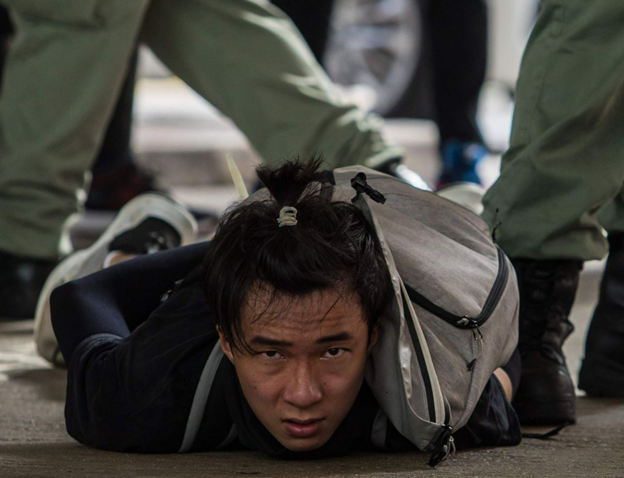
Riot police crack down on a July 1 protest in Hong Kong against the new national security law. DALE DE LA REY/AGENCE FRANCE-PRESSE/GETTY IMAGES
HONG KONG—Just eight months after Beijing imposed a new national security law to quell a pro-democracy movement, this freewheeling former British colony has all but been brought to heel.
Moving with a scope and speed few here anticipated, authorities have used the law to stamp out street protests, ban activists from lobbying foreign governments, gut the city’s legislature and arrest most of the opposition.
“Everything that’s happening in Hong Kong today was unimaginable a year ago,” political satirist Sam Ng, whose show was taken off air by a government broadcaster last year, told his 250,000 YouTube followers in January.
Beijing is signaling that this is just the start, outlining more institutional changes to ensure complete control over the city’s governance and eject opponents. China’s leaders are planning to revamp election rules that select Hong Kong’s top officials as well as grass-roots legislators. The proposals are expected to be formalized at its annual legislation meeting in early March.
Hong Kong can be governed only by “patriots” who aren’t opposed to the Communist Party’s leadership, Xia Baolong, the chief of Beijing’s office on Hong Kong affairs, said in a policy speech this week in Beijing. “Those who violate Hong Kong’s national security law aren’t patriots.”
Chinese government officials have foreshadowed further steps they believe are necessary in a city where resistance to Communist Party rule remains widespread and people still enjoy many more freedoms than those on the mainland.
Officials see a need to use the law’s broad provisions more firmly to tame critical media, revamp education and tighten internet controls, fashioning the liberal financial center in the authoritarian mold of China’s other cities. Pressure is mounting to change Hong Kong’s vaunted judicial system—for instance, Chinese officials are annoyed that judges often let activists go free on bail after they’re charged—even though any erosion of international legal standards may alarm foreign businesses in the city.
“The law is starting to demonstrate its power,” Luo Huining, the director of the Chinese government’s main representative office in the city, said in December. “Its many rules still need to be converted to a code of conduct for the citizens in Hong Kong.”
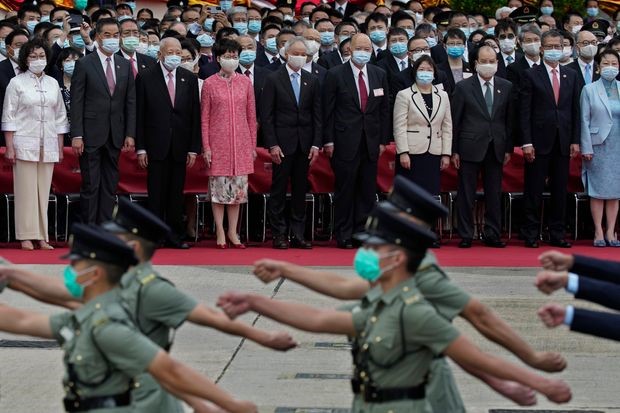
Hong Kong Chief Executive Carrie Lam, in pink, attends a flag-raising ceremony in October to commemorate the founding of the People’s Republic of China.
PHOTO: VINCENT YU/ASSOCIATED PRESS
Some activists say the crackdown has paralyzed dissent almost as effectively as guns and tanks did in Beijing in 1989, when crowds of student protesters were cut down around Tiananmen Square. Some Hong Kong dissidents have fled overseas, while others have gone underground. More are in jail or await trial. A national security hotline, set up in November for people to leave anonymous tips about potential violators of the law, has received 40,000 reports, expanding mainland China-style surveillance on the ground.
The national security law categorizes four crimes—secession, subversion, terrorism and colluding with foreign forces, punishable by up to life imprisonment. It also makes a point of requiring authorities to supervise and regulate schools, social organizations, media and the internet. It allows suspects to be sent to the mainland for trial, a prospect locals find most scary, and enables mainland state security agencies to operate from offices in Hong Kong.
Battle Fronts
One top target of police empowered by the new law is the culture of raucous street demonstrations. Rebellious slogans such as “Liberate Hong Kong, Revolution of Our Time,” became popular in 2019 and police immediately declared some illegal.
Protesters like Adam Ma, a deliveryman in his early 30s who sometimes styled himself as Captain America, are bearing the brunt. Carrying a shield like the Marvel character, Mr. Ma was determined to carry on the fight after police arrested 10 people at a protest on July 1—within hours of the law being passed
As public rallies faded quickly amid the coronavirus pandemic, Mr. Ma continued protesting, often cutting a forlorn figure in malls where he shouted defiant slogans and implored others in vain to join him. Mr. Ma said he refused to follow the red lines marked out by the law.
Police arrested him multiple times before he was put behind bars in November after government prosecutors charged him with secession, or calling for Hong Kong’s independence from China.
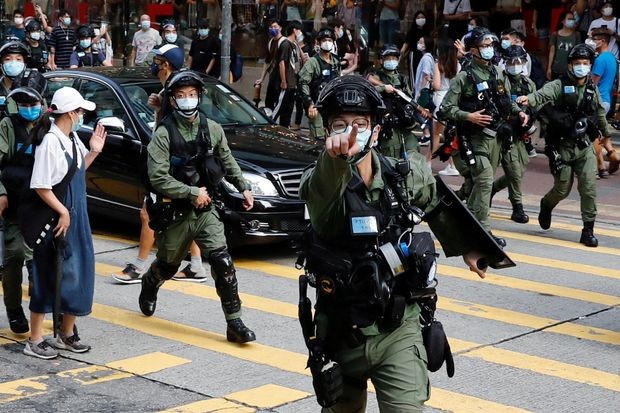
Riot police chase pro-democracy protesters in September.
PHOTO: TYRONE SIU/REUTERS
Protest slogans haven’t been completely eradicated. During the encore of a pop concert held by local band Tat Ming Pair in mid-November, many in the audience held aloft cellphone flashlights and shouted “Stand With Hong Kong,” another popular protest slogan that is frowned on by officials but has yet to lead to any criminal charges.
“The dissent remains in place and dissidents in Hong Kong are still looking for ways to keep the flame going,” said Steve Tsang, director of the SOAS China Institute in London, who specializes in Hong Kong politics.
A second target of national security police is to stop high-profile local activists who have successfully courted foreign governments and organizations to condemn or punish Beijing, such as sanctions the U.S. has imposed on Chinese and Hong Kong officials.
Agnes Chow, 24, one of the pro-democracy movement’s most popular young leaders, is a celebrity in Japan. Social-media followers share her Japanese language tweets about her life and struggle, dubbing her the “Goddess of Democracy.” Hours before the passing of the security law, she abruptly quit a political group she had co-founded and said she would no longer work with anyone overseas.
Police came for her anyway.
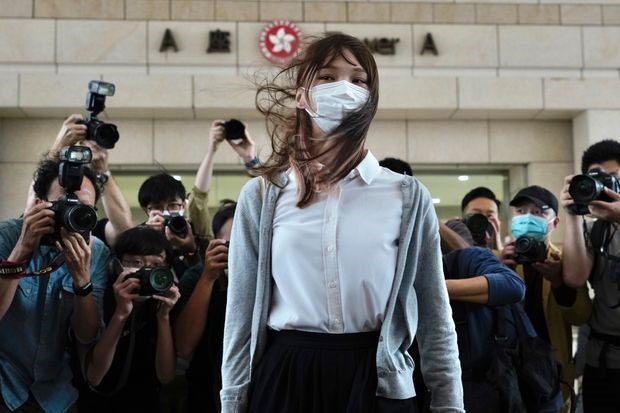
Activist Agnes Chow arrives at a Hong Kong court in November.
PHOTO: VINCENT YU/ASSOCIATED PRESS
One August Sunday, men in jeans and T-shirts appeared outside her rural home, filming it with cellphones. The next evening, police hammered on her door, searched her home and arrested her on suspicion of foreign collusion, which she denied.
“In the jail I couldn’t stop crying,” Ms. Chow later recalled in a video, her hair tinted pink and voice trembling. “It’s like Hong Kong has really arrived at a point of no return, further away from my wishes.”
Nathan Law, a former political colleague of Ms. Chow who fled to London moments before the law was passed, said, “That they went after her is just a farce, especially as she made such an effort to be silent after the national security law came into effect.”
China’s officials waged their biggest assault over the city’s legislature, a quasi-democratic body where opposition groups have long launched rowdy challenges to laws and policy proposed by the city’s Beijing-approved government.
Beijing assailed it on several fronts: disqualifying pro-democracy candidates from scheduled September elections; ejecting some popularly elected lawmakers, triggering a walkout by the opposition bloc; and postponing the poll for a year, citing the coronavirus.
A Jan. 6 sweep by more than 1,000 police on the homes of more than 50 opposition figures suggests a more far-reaching plan.
Back in April last year, legal academic Benny Tai, an irritant to Beijing since he initiated earlier street protests in 2014, came up with a strategy to use the legislature to shut down the government. He proposed organizing democratic candidates through primaries in an effort to win at least half the 70 seats in the legislature and torpedo the government’s budget proposal, a move that under the city’s 1997 constitutional document ratifying the handover from Britain would ultimately trigger the automatic resignation of the city’s leader.
For the democrats, the plan was legitimate political maneuvering. But Hong Kong Chief Executive Carrie Lam warned shortly before the July primaries that the event could be considered subversive.
Dozens of democratic candidates signed up regardless and more than 600,000 citizens cast votes. All 49 candidates involved were arrested in the January police operation, along with six alleged organizers, including Mr. Tai, a big roundup even by mainland China’s standards.
Police accused them of subverting national security by plotting to overthrow the city’s government.
“A severe winter is here,” Mr. Tai said after being released on police bail. “But Hong Kongers will walk against the wind in their own ways.”
New Front Lines
Chinese officials are now eyeing changes to Hong Kong’s other institutional check on executive power: its judiciary. They complain that judges release activists on bail soon after police arrest them, impeding Beijing’s goals. The grumbles underscore an uncomfortable truth: The city’s British-style independent justice system is incompatible with that of the mainland, where judges are considered part of the political apparatus that implements the party’s ruling.
In December, a higher-court judge overruled a lower-court decision to remand newspaper tycoon Jimmy Lai to jail ahead of a trial on a foreign collusion charge, brought against him after an interview with overseas media and meetings with foreign officials. The 73-year-old veteran democracy campaigner was released on bail, confined to house arrest.
Former Hong Kong chief executive C.Y. Leung called it a mistake that would allow Mr. Lai to flee like Carlos Ghosn escaped Japan. People’s Daily, the Communist Party’s mouthpiece, warned that the mainland’s national security agency in Hong Kong could take over the case if local courts had difficulties handling it, which would be the first such intervention
In subsequent reviews through the city’s courts, government prosecutors cited a provision in the new law that deprives any defendant of bail unless they can prove they pose no further risk to national security. Mr. Lai’s attorneys said the stringent threshold went against the tycoon’s rights under common-law principles.
The media mogul was sent back to jail by the city’s highest court and his bail application was formally rejected last week by a judge who ruled that the national security law’s no-bail clause trumps Hong Kong’s pre-existing rules and principles for bail.
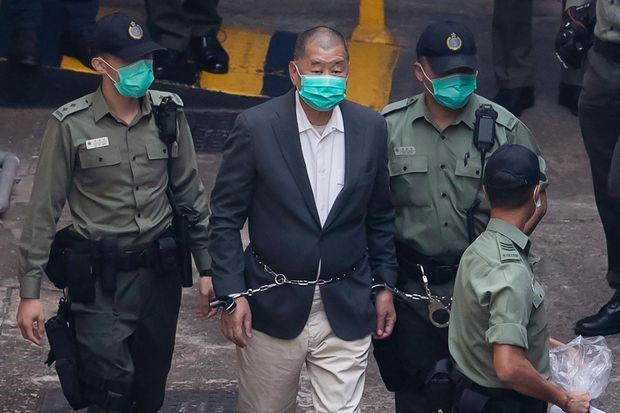
Hong Kong media tycoon Jimmy Lai in custody in December after being charged with foreign collusion.
PHOTO: KIN CHEUNG/ASSOCIATED PRESS
The free flow of information is another facet that helps Hong Kong serve as a bridgehead between the world and China: The city has a robust media and unfettered internet, in contrast to the propaganda and censorship prevalent on the mainland.
There are signs both are looming targets in the crackdown.
For 18 months, a website run by a self-described middle-school student calling herself Naomi Chan tormented local police here, publishing links to their social-media accounts and photos of their children.
It was an ethically dubious but attention-getting way of warning authorities to back off their pursuit of pro-democracy protesters.
Last month, the police struck back. Locals found they could no longer access the site, HKChronicles.com, in what appears to be the first use of new internet-censorship powers contained in the national security law.
HKChronicles sparred with police early and often, but initially retained the upper hand. Courts in Hong Kong banned the doxing of police officers and sentenced an employee of a telecom company for two years after he revealed personal data of the force. The mysterious administrator of HKChronicles remained active and added more data to its overseas servers.
The national security law gave the police a boost.
On Jan. 6, users reported that the site had been blocked, an unprecedented discovery in the city. A week after the disconnection, a local internet service provider, Hong Kong Broadband Network, confirmed it just disabled the access to comply with the new law.
Ms. Chan moved the site to new addresses, which soon became inaccessible too. She advised visitors to start using a VPN, or virtual private network to bypass blockers, a common strategy in mainland China. The same could happen to local platforms tomorrow, she said in a statement to users, “and it could be Facebook, Instagram and Google the day after.”
Rose Luwei Luqiu, an assistant professor at Hong Kong Baptist University, predicts more internet censorship will come but says locals are too tech-savvy and rebellious to fall under the influence soon. “Uncertainty is in the long-term future,” she said.
Hong Kong Police and the city’s Security Bureau wouldn’t say whether they took action against HKChronicles but stressed that the law allows them to order internet service providers to disable a connection to any site deemed to endanger national security.
“Lawful use of the internet by Hong Kong residents continues freely and wouldn’t be affected,” said the Security Bureau in a statement.
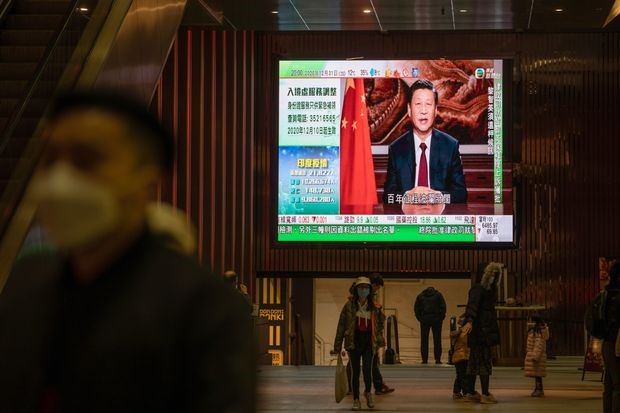
A news report on a New Year’s speech by Chinese President Xi Jinping is shown on a public screen in Hong Kong.
PHOTO: ROY LIU/BLOOMBERG NEWS
Source: The Wall Street Journal, February 25th, 2021 | Wenxin Fan, with contributions by Natasha Khan, Joyu Wand & Dan Strumpf